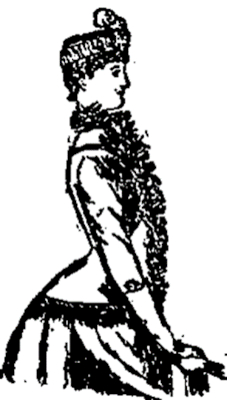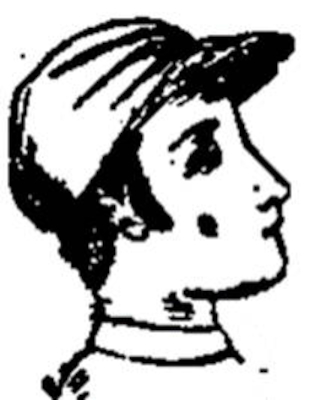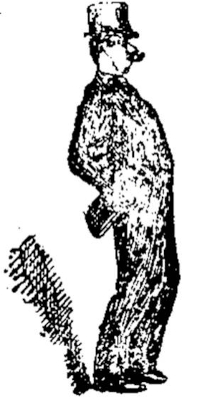This article has been transcribed from a copy of the Cardiff Times in the online collection of scanned Welsh newspapers 1804-1919 in the National Library of Wales, with grateful recognition of the free access accorded to all readers. Paragraph breaks have been introduced for easier reading.
The annual reference work on racing form was Form at a Glance: Alphabetically Arranged, and Showing, at one Opening of the Book and in one Single Reference, the Entire Performances for the Year of Every Horse Running on the Flat ... (Birmingham, England, 1881 etc.) —— David Skilton
There are certain things, sir, in this world which are best avoided by the man who desires to live a peaceful and sober life, and to be free from those worries and anxieties which beset sorely tried mortals in spite of their best endeavours to avoid them. Amongst these are amateur tipsters and their tips. Now that the racing season is fairly on the way the men who give you tips in a friendly way are once more on the war-path, and hardly a day passes but you are told of a certainty for a coming race which will fill your heart with joy and your pockets with money.

The smart young man who gives 'dead snips.'
There is no one, sir, who is so certain as a man who has a tip. He knows it will come off, and so he tells all his friends to back it, though he occasionally has sense enough not to back it himself, which proves that there are times when a man's commonsense overweighs his infatuation in spite of himself — though it is, perhaps, fair to add, sir, that he frequently refrains from 'having a bit on' from the important fact that he is minus the 'bit' to have on.

A damsel who bets on tips.
Now, sir, there are many types of tipsters as there are many kinds of tips (though variety in the matter of tips is usually but poor consolation to the backer thereof), and I will touch on the salient points of one or two of them in my usual discriminating style.
Firstly, there is the fatal tipster who has got what he designates as 'a dead snip,' and which invariably [–] so he says – has come direct from the owner or trainer of the horse he knows cannot lose the race he tips it for. Now, sir, it has long been a mystery to me why an owner or trainer should give his 'dead snips' to people who have no connection with him, and whose interest in the turf is limited to supplying accommodating book-makers with their weekly amount of loose cash, yclept 'pocket-money.' For, sir, I have noticed that the purveyor of good things given him by owners and trainers generally holds a position in the world of commerce, the salary attached to which could hardly be considered fabulous. Yet he would give you the impression that he was in the secret of the great stables of the turf and on familiar terms with half the leading members of the Jockey Club. Where he in reality gets his tips from is a mystery, but apparently he gets them with a regularity that, if he backed them all, would speedily land him into the Bankruptcy Court. But as he never fails to trot out a 'dead snip' for every important race of the season, I can only conclude that, for reasons best known to himself, he does not. When he does happen to back a winner he endeavours to convey the impression that he has won a large stake (most like a modest half-crown would be his largest stake on a race), but when he backs a loser he never tells his friends of the fact, but insinuates that he had a private hint (also from an owner or trainer) at the last moment that his tip was being saved for something else.
Then, sir, there is the tipster who is lucky. He usually commences his career by investing a very modest stake on a horse he sees tipped in a sporting paper, which manages to get first past the post. He knows nothing about racing, but having a run of luck he at once poses as an authority on the turf and tells all his friends and acquaintances that he is 'in the know' and can put them up to one or two good things now and then. By the time he has backed a few winners he has commenced to read all the sporting papers, and blooms out as a tipster whose information is to be respected and relied upon. This tipster, sir, is not quite so dangerous as the man who claims acquaintance with owners and jockeys, for he usually gets so mixed up by the legion of papers he reads that he at length has no definite opinion as to the winner of any particular race, but goes into details as to the chances of several candidates for each race and advises his friends to have a bit on 'both ways,' advice which if followed out hardly increases the belief of his friends in his ability as a tipster.

The jock[e]y tipster
Another type of the amateur tipster is the man, usually middle-aged, who believes in form. Of all the army of amateur tipsters, sir, he is the most to be avoided. He never moves without 'Form at a Glance' in his pocket, and I verily believe he attempts to increase his acumen by sleeping with the sacred and much-thumbed volume under his pillow. He can tell you the [the] performance of almost any horse on the turf, and can point out on the publication of the weights for the handicap which horse ought to win on form, and whether any horse has not been fairly handicapped on its merits. To follow his tips it would be necessary to have a banking account of unlimited capacity, for it is one of his great ideas that if a horse has shown form it must be backed every time it runs. 'It is sure to win in the long run' he argues, and in the 'long run' backers of his tips are landed on to the verge of ruin, and find that when the vaunted good thing does come off that they have either got tired of backing it or are in such a financial condition that it is not convenient to put down the stake necessary to verify the tipster's opinion. There is one remarkable feature about this type of tipster – his firm and unshaken belief in his method of finding winners, In spite of reverses which would have disheartened most men, he sticks to his opinion that form is the keystone to turf success, and his only regret is that fortune has not enabled him to hold on long enough.

The jockey tipster's relative
A terrible type of tipster is the man who is a distant relation of a jockey, and who gets his tips through the jockey's father, cousin, or brother-in-law. He always impresses on you the fact that his information must be reliable because the jockey who sent it is his forty-first cousin three times removed (I wonder how often a cousin can remove and yet remain a relation!), and that he is specially engaged to ride the horse he sends, and he says it can't lose. Yet, sir, it not unfrequently does. The peculiarity of this man's tips is that they are always the horses his far-removed relative is engaged to ride, and who seems to be imbued with a notion that if he rides a horse it must win, a notion which, I regret to say, experience has rudely shattered, and this position in the list of the leading jockeys is very nearly at the end. Now, sir, I think there is a moral to be deduced from these amateur tipsters and their ways, and that is that it is one of the strongest weaknesses (pardon the paradoxical phrase, sir) of the human constitution for men to wish to pose as authorities on something. All men, if they are worthy of the name, are possessed of a tinge of ambition and wish to dispense information — more or less reliable — to their fellow men. They like to feel that they are benefactors, and in their inmost souls the amateur tipsters are, I feel certain, sir, fully convinced when they give you a tip that they are doing you a genuine service. They act with the most laudable motives, else why should they dispense their information — in perfect confidence and secrecy — to everybody they come across? This being the case, sir, one can only regret the fatality which generally precludes their efforts from resulting in permanent pecuniary benefit to their friends and followers.
Last modified 3 April 2022